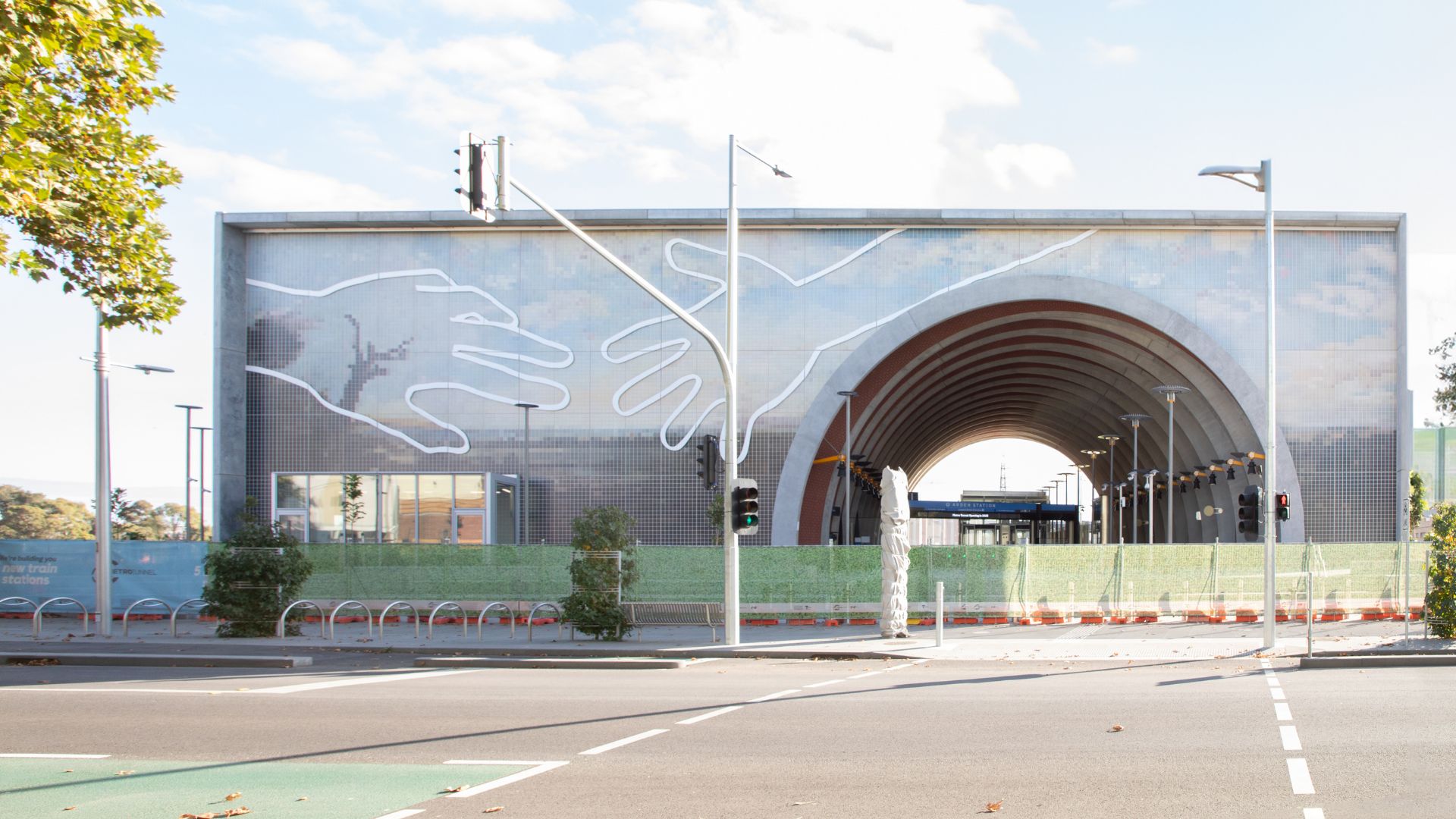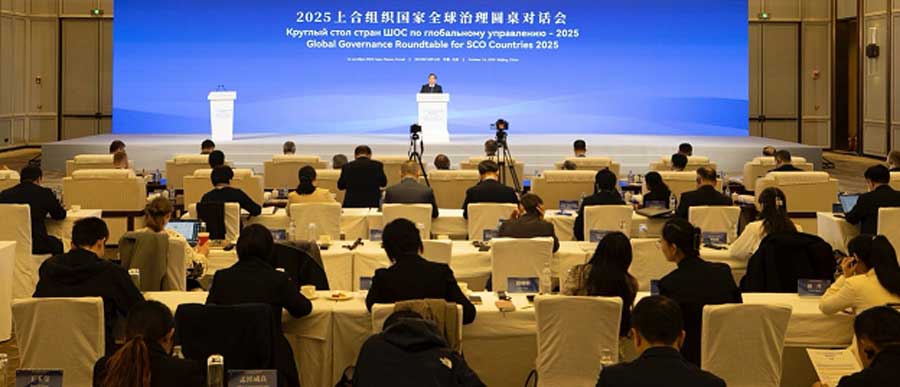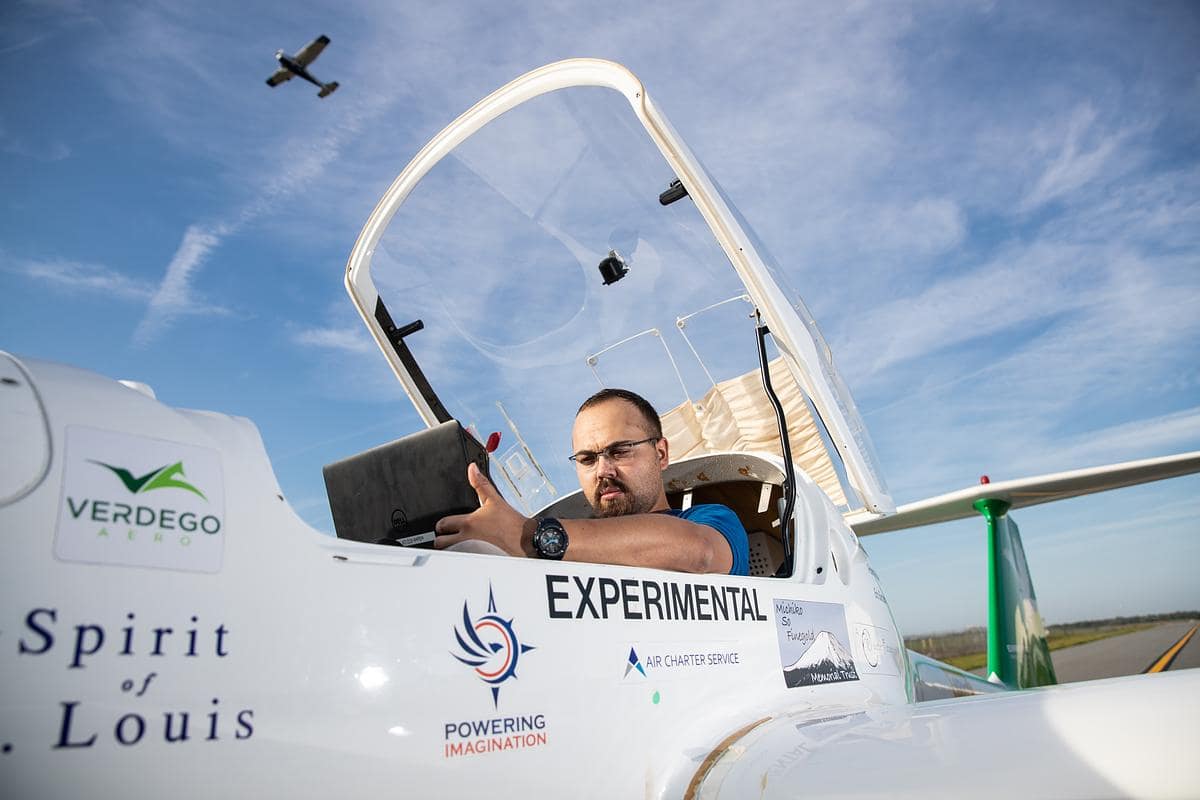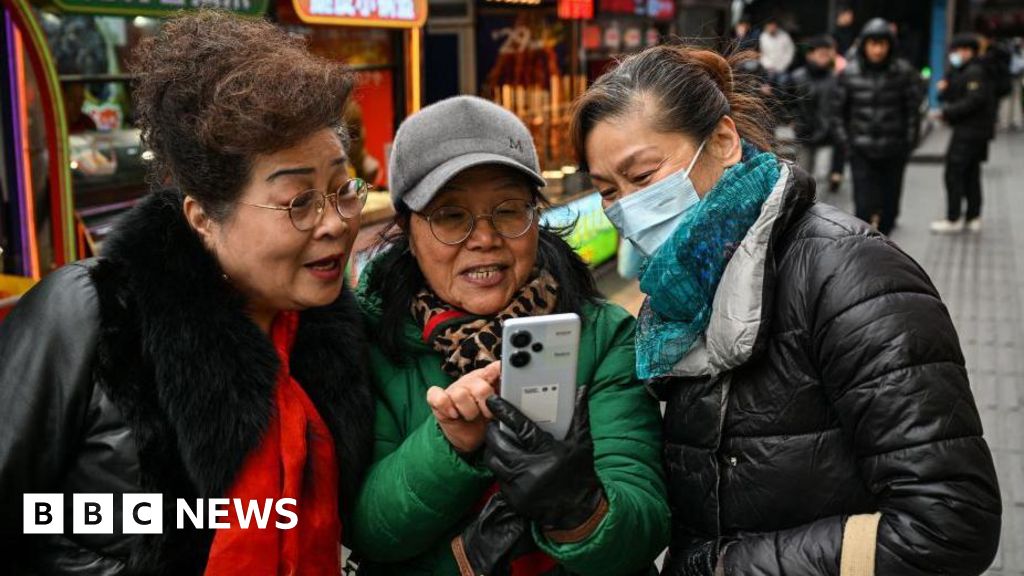Eighty years since the first of a beloved fleet of trains was introduced to the world, a national blue plaque is being unveiled at the redbrick house in Gloucestershire where the Rev W Awdry worked on his railway stories.
Blog
-

Blue plaque to be unveiled at home of Thomas the Tank Engine creator | Heritage
The blue plaque to be… -

Active Surfaces® purify the air at a Melbourne train station : DesignWanted
Train stations in city centres are urban areas often associated with dirt and pollution. However, in the heart of Melbourne, a railway station is quietly cleaning the air around it. The Arden Station façade actively fights pollution, kills…
Continue Reading
-

2025 Global Governance Roundtable for SCO countries held in Beijing
– Advertisement –
– Advertisement –
– Advertisement –
BEIJING, Oct 17 (APP): The 2025 Global Governance Roundtable for SCO Countries aimed to contribute “SCO wisdom” to addressing the challenges and deficits in current global governance…
Continue Reading
-

Alzheimer’s And Cancer May Soon Be Treated With Sounds We Can’t Hear : ScienceAlert
Sound waves at frequencies above the threshold for human hearing are routinely used in medical care.
Also known as ultrasound, these sound waves can help clinicians diagnose and monitor disease, and can also provide first glimpses of your…
Continue Reading
-

Embry-Riddle, Brazilian Researchers to Tackle Challenge of Keeping Electric Aircraft Cool
Researchers at Embry-Riddle Aeronautical University and Brazil’s Instituto Tecnológico de Aeronáutica (ITA) will combine forces on one of the main challenges of electric aircraft — controlling the heat spikes they generate at takeoff.
The collaboration is supported by a $450,000 National Science Foundation International Research Experiences for Students (NSF IRES) grant.
“Both sides have been working on the heat management challenge, so there are some real synergies,” said Dr. Sandra Boetcher, the interim department chair and professor of Mechanical Engineering and principal investigator on the project. Boetcher is working with co-principal investigator Dr. Mark Ricklick, associate professor of Aerospace Engineering, as well as Brazilian colleagues Dr. Guilherme Borges Ribeiro and Dr. Elisan dos Santos Magalhães.
The collaboration is intended to offer hands-on research training to students, preparing them to tackle the issue of heat management on electric aircraft, considered key to reducing the aviation industry’s carbon footprint. The project will involve three cohorts of five Embry-Riddle students over the next three years spending eight to ten weeks between May and August in Brazil at ITA.
Boetcher said the heat management research that she and Ricklick undertake tends to be fundamental, developing prototypes, for example, that can be further tested. Similar research out of ITA, which is affiliated with the Brazilian Air Force and the Brazilian multinational aerospace corporation Embraer, tends to be applied.
One of the main technologies the researchers from both countries are exploring relates to phase-change materials, which convert from a solid to a liquid at certain temperatures and are capable of absorbing large amounts of heat during the process.
Drs. Sandra Boetcher and Mark Ricklick, standing in front of an aircraft turbine, received a $450,000 NSF grant to offer a student research collaboration with Brazilian colleagues on heat management of electric aircraft. (Photo: Sandra Boetcher)In a phase-change process, energy, in this case heat, is expended on overcoming the molecular forces holding a solid structure together, changing the material to a liquid. No temperature rise occurs during the change. This happens in everyday phase changes, Boetcher explained.“It’s like you’re melting an ice cube,” she said. “The ice cube is melting, but the temperature stays the same,” until the ice cube becomes water and the water’s temperature starts to climb.
The phase-change materials being investigated by the researchers capitalize on the phenomenon and can be applied as a slab under an aircraft’s electrical circuit to keep it under a certain temperature.
Modeling to optimize the performance of phase-change materials with computer simulations can be time-consuming, with computational fluid dynamics problems taking as long as two weeks to solve.
Magalhães brings coding expertise that could “speed up the process of solving the problem,” Boetcher said.
The researchers will also look at other technologies to manage heat in electric aircraft, including ones that could provide active cooling rather than passive heat absorption.
Boetcher said she thinks the students who travel to Brazil will benefit deeply, even apart from participating in the technological innovations that could result.
“It’s dealing with other cultures, with other collaborators, how they view things, how they operate, how they work,” she said. “There’s a lot of maturing when you get to have these opportunities abroad.”
Dr. Jeremy Ernst, vice president for research and doctoral programs, further emphasized the value of the collaboration.
“The IRES program is impactful in creating research exposure and authentic international experience,” Ernst said. “The work led by Dr. Boetcher and Dr. Ricklick is of high value to students, offering enhanced cultural immersion in Brazil within its rich aviation and aerospace environment. This experience allows students to develop skills that are directly transferable to the global workforce.”
Continue Reading
-

Liverpool seek mojo against Man Utd, Postecoglou hunts first win
The champions have lost just one of their past 14 Premier League meetings against United but have suffered three straight defeats in all competitions, with Arsenal now top of the…
Continue Reading
-

Vietnam Reclassified to Emerging Market Status by FTSE Russell
Vietnam’s upgrade to Emerging Market status by FTSE Russell is a green flag for global investors and a step towards greater financial market integration. The 2025-2027 reforms can translate into easier capital access and disclosure transparency for businesses looking at a long-term foothold in Vietnam.
FTSE Russell announced on October 7, 2025, that Vietnam will be upgraded from Frontier to Secondary Emerging Market (EM) status, from September 21, 2026, after a final review scheduled for March 2026. The decision comes after nearly seven years of gradual reform since Vietnam was first placed on the FTSE watchlist in 2018.
Vietnam’s upgrade to Secondary Emerging Market status places it alongside China, India, Indonesia, the Philippines, and Qatar. It ranks below Advanced Emerging Markets such as Thailand and Malaysia, and Developed Markets like Singapore.
Understanding the FTSE classification and upgrade process
FIND BUSINESS SUPPORT
FTSE Russell’s Equity Country Classification Framework evaluates markets based on a set of quantitative and qualitative indicators that measure openness and regulatory quality.
The Secondary Emerging Market status hinges on countries satisfying these primary criteria:
- Market accessibility for foreign investors;
- Settlement and custody infrastructure;
- Transaction transparency and liquidity; and
- Market size, free float, and institutional participation.
Vietnam successfully met all these conditions and addressed many longstanding barriers that were limiting investor participation. The country addressed two critical technical barriers that previously prevented the upgrade, including:
- Settlement cycle and pre-funding requirements
In November 2024, the Ministry of Finance issued Circular 68/2024/TT-BTC, which introduced the Non-Pre-funding Solution (NPS) model. Before, foreign institutional investors were required to fully pre-fund equity purchases before execution, a rule that discouraged global funds accustomed to T+2 settlement systems. Under the NPS, securities firms now bear the responsibility of assessing and managing payment risk under the contracts.
- Failed trade processing mechanism
Vietnam implemented a mechanism for handling settlement failures to improve transparency in post-trade activities. It ensures the timely resolution of settlement failures and brings Vietnam’s back-office procedures closer to international standards.
Interim review and pending conditions
Although Vietnam has met the requirements for EM classification, the March 2026 interim review will evaluate one remaining area, which is direct access for global brokerage firms.
FTSE Russell noted that this is not a mandatory criterion for maintaining EM status, but it remains crucial for Vietnam’s index and for aiding participation by major global institutional investors.
Projected capital inflows and portfolio effects
The upgrade is expected to catalyze a lot of foreign capital inflows. Analysts have made various investment projections, some of which like:
FIND BUSINESS SUPPORT
- FTSE Russell estimates inflows of around US$6 billion from passive index trackers that replicate the FTSE Emerging Market Index;
- The World Bank projects short-term inflows of approximately US$5 billion before and after the upgrade from passive and active investors, and long-term potential inflows could reach $25 billion by 2030; and
- HSBC forecasts range from US$3.4 billion (active funds) to US$10.4 billion (total including passive funds).
Vietnam is expected to account for approximately 0.5 percent of the FTSE Emerging Market Index once the reclassification takes effect.
Active fund participation
According to HSBC, approximately 38 percent of Asia-focused funds and 30 percent of global emerging market funds already hold Vietnamese equities, which suggests that beyond passive index flows, Vietnam could attract new active fund allocations too.
Liquidity, valuation, and trading depth
Vietnam’s stock market has demonstrated strong liquidity in 2025. In July 2025, average daily trading volume reached over 1,422 million shares as average daily turnover reached VND 34,993 billion (US$1.32 billion). The market hit historic liquidity records with total trading value on the Ho Chi Minh City Stock Exchange (HOSE) as it approached VND 78.2 trillion (US$2.9 billion) in early August 2025. As of May 2025, Vietnam Exchange posted nearly US$18 billion in monthly trading value, overtaking Malaysia (US$12.1 billion) and Indonesia (US$15.3 billion)
Anticipation of the FTSE announcement has already influenced domestic equity performance. The VN-Index has risen from 1,100 points in April 2025 to nearly 1,700 points by October 2025, which is a 50 percent jump and a 33 percent year-to-date gain; thus, Vietnam has become the best-performing market in Southeast Asia.
HSBC analysts, however, caution that front-loading, the tendency of investors to buy in anticipation of future reclassification, may limit further short-term upside. Profit-taking could occur after the announcement, as observed in other markets following index upgrades. Nevertheless, most research expects active funds to disburse gradually between March and September 2026.
Domestic reforms enabling the upgrade
Vietnam’s reclassification is a cumulative result of regulatory and structural reforms that have improved its foreign access.
Central counterparty and post-trade reforms
The State Securities Commission (SSC) has given a roadmap to launch a central counterparty (CCP) system for Vietnam’s equity market by Q1 2027. Milestones on the way are:
FIND BUSINESS SUPPORT
- Q1-Q2 2026: SSC and the Vietnam Securities Depository and Clearing Corporation (VSDC) will issue a new circular to replace Circular 119/2020/TT-BTC on registration, custody, and settlement;
- Q3 2025-Q1 2026: Establishment of a VSDC subsidiary to handle CCP functions;
- Q3 2025-Q4 2026: Introduction of a revised accounting framework to replace Circular 89/2019/TT-BTC;
- 2026: IT system upgrades, staff training, and simulation testing; and
- Q1 2027: Full-scale operation of the CCP.
CCP will help foreign institutional investors reduce currency risk during the payment cycle and provide safer mechanisms against payment risks.
Technology infrastructure modernization
Vietnam launched the KRX trading platform on May 5, 2025, in partnership with the Korea Exchange (KRX). The platform addresses several bottlenecks and expands derivative products available to investors with these new features:
- Same-day trading (T+0) and short selling;
- Faster settlement processing; and
- Support for options contracts and CCP clearing.
Disclosure and transparency
From January 1, 2025, all VN30 companies (the 30 largest listed firms) have been required to publish disclosures in Vietnamese as well as English. By the end of 2026, all approximately 2,000 listed and registered trading companies must complete the transition to English-language disclosures. Currently, only about 25-30 percent of listed companies provide complete English disclosures.
Other reforms
Other transformative reforms include:
- Removal of pre-funding obligations: As noted above, Circular 68/2024/TT-BTC eliminated the full pre-funding requirement for foreign investors.
- Foreign ownership liberalization: Decree 245/2025/ND-CP, issued on September 11, 2025, removed provisions that allowed listed companies to set foreign ownership limits below the legal maximum. All public companies must now publicly disclose their maximum allowable foreign ownership ratio within 12 months of the decree’s coming into force.
- Simplified trading code issuance: Foreign investors can now receive an electronic securities trading code (ESTC) and commence trading immediately without submitting physical paperwork.
- Accelerated IPO and listing timelines: The period for securities to be traded after listing approval was shortened from 90 days to 30 days, and the overall listing process was reduced by 3-6 months.
Remaining reform gaps
Despite its upgrade, Vietnam continues to face structural challenges that must be addressed to sustain investor confidence.
FIND BUSINESS SUPPORT
- Currency convertibility: The Vietnamese Dong is not freely convertible and cannot be remitted overseas. Foreign exchange transactions remain subject to State Bank of Vietnam (SBV) controls.
- Global broker access: The March 2026 interim review will specifically assess progress in this area.
- ESG disclosure: Only 25 percent of listed companies publish environmental, social, and governance (ESG) reports, most without external assurance.
Integration with global finance
The FTSE upgrade is a part of a series of efforts Vietnam is taking for global financial integration and capital market openness. Vietnam’s Finance Minister Nguyen Van Thang stated that “the official recognition and upgrade of Vietnam’s securities market is clear evidence of the country’s sound development path and its growing capacity to integrate deeply into the global financial system”.
The government has set an ambitious target of 8 percent GDP growth for 2025 and aims to achieve double-digit growth between 2026 and 2030. The present roadmap for Vietnam’s stock market development goes up to 2030. The market can aim for medium-term targets for MSCI Emerging Market upgrade between 2026 and 2027 and can have long-term goals for FTSE Advanced Emerging Market status by 2029 and 2030.
Monetary and currency management
FIND BUSINESS SUPPORT
Vietnam’s GDP growth recorded an 8.23 percent year-on-year rise in Q3 2025, the fastest since 2022. The Purchasing Manager’s Index was 50.4 in September 2025, and total trade volume reached US$680 billion, with exports up 14.8 percent to US$262.44 billion.
The SBV maintains an inflation target of 4.5 percent for 2025. As of mid-year, consumer prices rose 3.27 percent, and core inflation stood at 3.16 percent. Refinancing rates remain at 4.5 percent (at an accommodative policy stance).
The Federal Reserve’s rate cuts in 2025 have provided room for Vietnam to maintain low domestic interest rates without pressuring the dong. As we noted, the Vietnamese Dong is not freely convertible as foreign exchange transactions still are subject to SBV controls.
Vietnam’s sovereign credit ratings remain below investment grade but stable:
- Standard & Poor‘s BB+ with stable outlook (affirmed August 2025);
- Fitch’s BB+ with stable outlook (affirmed June 2025); and
- Moody’s: Ba2 with stable outlook (unchanged since 2022).
The EM reclassification could fuel investor appetite for Vietnamese sovereign bonds, which could potentially lower long-term borrowing costs. Vietnam now stands at the threshold of deeper global integration. Despite global headwinds, Vietnam’s domestic reforms and foreign investors’ belief in its robustness can provide a much-needed boost for double-digit growth.
Read more: Vietnam’s Rising Purchasing Power: 2024 Household Living Standards Survey
(US$1 = VND 26,349.5)
About Us
Vietnam Briefing is one of five regional publications under the Asia Briefing brand. It is supported by Dezan Shira & Associates, a pan-Asia, multi-disciplinary professional services firm that assists foreign investors throughout Asia, including through offices in Hanoi, Ho Chi Minh City, and Da Nang in Vietnam. Dezan Shira & Associates also maintains offices or has alliance partners assisting foreign investors in China, Hong Kong SAR, Indonesia, Singapore, Malaysia, Mongolia, Dubai (UAE), Japan, South Korea, Nepal, The Philippines, Sri Lanka, Thailand, Italy, Germany, Bangladesh, Australia, United States, and United Kingdom and Ireland.
For a complimentary subscription to Vietnam Briefing’s content products, please click here. For support with establishing a business in Vietnam or for assistance in analyzing and entering markets, please contact the firm at vietnam@dezshira.com or visit us at www.dezshira.com
Continue Reading
-

Green ruled out of ODI series against India with side soreness, Labuschagne called up
Australia have copped another major injury blow with Cameron Green ruled out of the ODI series against India with low grade side soreness, which could have significant implications for the upcoming Ashes.
The 26-year-old Green was ruled out of the…
Continue Reading
-

This common morning habit is silently damaging arteries; can increase heart death risk by 87%, says study
How we start our mornings has a lot to do with how the rest of the day is going to go. From picking up mobile phones after waking up, to struggling to get that one cup of coffee, all morning rituals matter. At first, these might seem harmless…
Continue Reading
-

China’s biggest shopping event starts five weeks early to revive spending
It’s known to be China’s biggest online shopping event – taking place on 11 November each year.
But this year, Single’s Day sales have already begun in mid-October, as part of efforts by Chinese retailers to boost spending in a sluggish market.
China has been plagued with issues like growing youth unemployment , a prolonged property crisis, steep government debt and an ongoing trade war with the US – all of which is making the country’s consumers cut back on spending.
The Chinese government has been spending billions – through family subsidies, more wages and discounts for consumer goods in a bid to counter this, but retail sales growth is still failing to meet expectations.
Originally created by Alibaba as a Chinese shopping festival, Singles’ Day is akin to Amazon’s Prime Day or Black Friday promotions elsewhere in the world.
A major revenue driver in the final quarter of the year, the event is marked with deep discounts online and in stores, with most retailers in the country competing for sales.
Over the years, the sales window has evolved from a single day to one of the year’s biggest shopping events, often ushered in with extravagant opening events featuring popstars like Jessie J.
But this year, retailers launched their sales campaigns in October, coinciding with the end of China’s Golden Week holiday.
Platforms like Taobao, JD.com and Douyin are actively promoting “11.11” sales, with banners on their apps showing discounts and vouchers.
Alibaba, which runs e-commerce platforms Taobao, Tmall and AliExpress, said in its newshub that it is kicking off this years “11.11 Global Shopping Festival” on 15 October.
The firm is also tapping artificial intelligence in its search and recommendation tools to make it easier for shoppers to navigate its sprawling sites and suggest relevant products.
Chinese consumers have adopted more cautious spending habits since the Covid-19 pandemic – a trend that has continued as the country continues to battle deflation.
The spending crunch has hit high-end retailers especially hard. Fashion brands like Louis Vuitton and Burberry reported a drop in sales in recent months in China, which accounts for around a third of global luxury sales.
However, investors seem optimistic about a rebound in China’s market, as shares of luxury brands like LVMH and Moncler rose this week, lifted by signs of improved demand in the region.
Continue Reading
